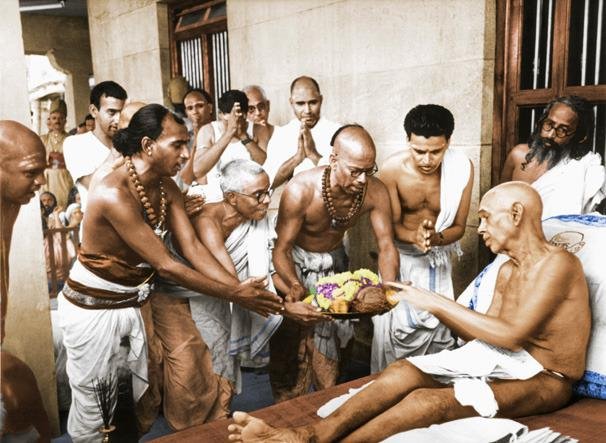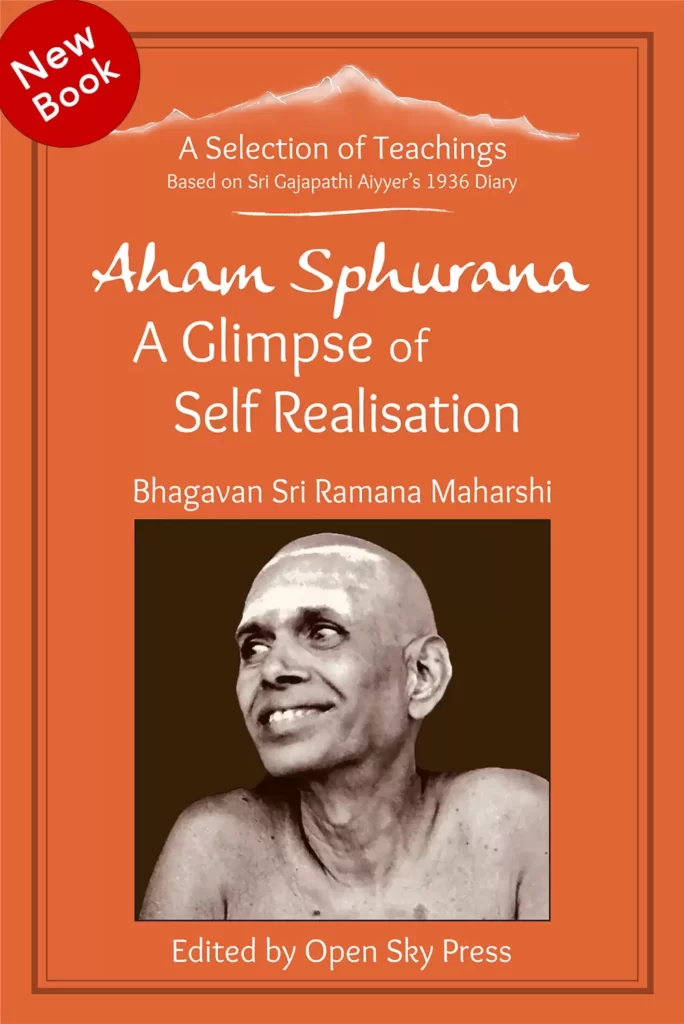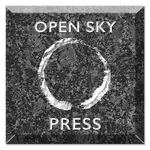
Aham Sphurana
A Glimpse of Self Realisation
New Book about Sri Ramana Maharshi

Available Worldwide
On www.openskypress.com and Amazon:

“In my opinion, Aham Sphurana, a Glimpse of Self Realisation, will become a Treasure Trove of Wisdom to the Seekers of Truth in general, and particularly to the devotees of Bhagavan.”
Swami Hamsananda – Athithi Ashram, Tiruvannamalai
The Answer is to Enquire,”Who Am I”
Pages 467-470
A curious, altogether ridiculous personality has arrived at the ashram gaudily dressed in a three-piece suit, a beaver hat, and an ascot cravat. In this weather, his skin ought to catch fire; I wonder how it still seems to be intact. He carries an ebony cane mounted with a miniature bronze, roaring lion’s head.
He is attracting curious glances everywhere. Apparently the sarvadhikari [ashram manager-Ramana’s brother] had fallen down in a fit of fright upon first seeing the man and his cane. Thinking he must be polite to his hosts, he is taking off his hat whenever he meets anyone in the ashram, with the result that people here have come to the conclusion that some madman has been let loose upon them. Thinking they are going to be attacked, everyone runs away from him as soon as he is spotted.
His head is abnormally large and looks like a gigantic ostrich egg. The rest of his body is malnourished and thin. He sports a completely bald head and a pencil moustache. A comical goatee adds the finishing touches to the eccentricity of his appearance. Bizarrely, his protuberant eyes look hilariously tragic – they convey the impression of a man who is unable to take himself seriously, but has always longed to.
He entered the Hall and bowed low to Bhagavan, hat clasped in hand tucked against tummy, monocle dangling in the air and all. Bhagavan seemed to survey him with quiet interest. He introduced himself, with Chadwick acting as his interpreter. His name is Monsieur Pierre Géant, but he is known as “L’affolé néant” by his friends. He comes all the way from the Republic of Grand Liban – Greater Lebanon, formerly part of Turkey; a descendant since the conclusion of the Great War. He was always interested in Mysticism and the prospect of experiencing a personal union with God Almighty.
In 1896 he had arrived at a turning point in his life: he met Swami Vivekananda in England. Vivekananda had recommended the study of his Guru’s life, as well as of Vedanta. Then the Distraught One had engrossed himself in Sri Ramakrishna and Vedanta for years. Sri Ramakrishna’s experiences thrilled him to the core and he wanted them replicated in his own case. Just when he was feeling hopelessly dejected and agitated that Ramakrishna was in the flesh no more, Paul Brunton’s book was read out to him, quite casually, by an English-speaking friend; and the “Maharishi” therein interested him profusely. So he had come straightaway in a steamer, the next available one. He had questions for Bhagavan.
Q.: Is your teaching the same as Sri Ramakrishna’s?
B.: Absolutely.
Q.: If I-am-God is the Truth, does it not amount to arrogance?
B.: It does not mean you – as you incumbently imagine yourself to be – are God. It means, God is the Real “I”.
Q.: There is a self which is coexistent with the personality and attaches itself to the body. This is known as the mind. Then there is the Parabrahman [Supreme Being] mentioned in Vedanta. This is known as the Impersonal Essence of man. Which is my true self? Can I have more than one self?
B.: The mind is a phantom. In the Impersonal Essence the mind is nowhere to be found.
Q.: How to reach it?
B.: There is nobody there to reach it. Thus, there is no reaching it. Subside and let the Light shine forth. Subside as the mind and shine as the Self.
Q.: Practically, what is the method for it?
B.: The investigation, “Who am I?”.
Q.: But this investigation also is made with mind only.
B.: It commences, no doubt in the mind. It ends in no-mind.
Bhagavan asked Chadwick to read out Who am I? to him in French. This was done and the creature listened carefully, cocking his huge head against a meagre shoulder, so that his left ear should be better exposed to the sounds emanating from Chadwick’s lips. Presently he extracted a small ear-trumpet from the folds of his laborious clothes and grooved the ear-piece of the same into his left ear.
The bell of the contraption was positioned to face Chadwick’s direction. Bhagavan looked at the surprised faces in the Hall and laughed.
Q.: What is the authority for saying that the world is a dream? Where is the proof, I mean?
B.: Did you exist in sleep?
Q.: Yes.
B.: Do you exist now?
Q.: Yes.
B.: Then what is the difference [in the two states]?
Q.: I am not aware of my body and world [in sleep].
B.: Being aware of the body and world is called dreaming. Remain unaware of them now also. That truly is Jnana or Reality. This alone is the state of true wakefulness.
Q.: But how can we call this world a dream?
B.: Why not?
Q.: There are so many people on the Earth. If it is a dream, whose dream might it be?
B.: Yours.
Q.: But why pick me out specifically? For instance, it may even be the dream of the amiable Monsieur Chadwick here.
B.: Only you are there.
Q.: What about you, then, sir?
B.: No, I am not here or there. I AM. There is no here or there or anywhere. I AM THAT I AM.
Q.: I comprehend not.
B.: Evidence produced by the sensory organs is merely mental in nature. All knowledge of diversity is fictitious mental information. Your Being is Real. There is nothing else.
Q.: I want proof.
B.: If proof is given to you, how will you be able to believe it?
Q.: I comprehend not.
B.: The proof given to you, if any, is also going to be mere mental information only.
Q.: What can be believed, then, as true?
B.: Whatever is believed is false only. Truth is in Being only.
Q.: How to attain this Being?
B.: By giving up the idea that there could be anything to be attained and all other ideas.
Q.: Practically, how can I go about it?
B.: Investigate ‘Who am I?’.
Q.: Will repetition of sacred syllables not be helpful? Do not the sacred incantations of your religion hold some sort of latent spiritual power? By unlocking this power or energy can we not reach the state of Enlightenment?
B.: You have been appraised of the direct method.
Q.: The others are by-lanes or diversions?
B.: Yes.
Q.: Should food restrictions be followed by a seeker after Enlightenment? Can I eat pork?
B.: Try to thrive on grain and fruit.
Q.: Can the investigation of ‘Who-am-I?’ be done in your presence only? If I do it at, say, Nantes, would I able to succeed in Enlightening myself? Is your physical presence needed? In order so as to bring about a successful outcome to the practice, I mean?
B.: It is the mind that matters. If the mind is kept steadily poised in introversion, such questions cannot arise even.
Q.: Is worship of, or even belief in, a personal God permissible?
B.: Yes.
Q.: Does it not thwart one’s progress toward Enlightenment?
B.: When you become ripe enough, you will no longer feel that it is you who are praying.
Q.: Is philanthropy a distraction or ought one try to help the suffering world?
B.: It varies according to the temperament of the individual’s psyche.
Q.: I see. What about my case?
B.: When you see suffering, what thought first crosses your mind?
Q.: “I wish God had created a world in which there was no suffering.”
B.: Those destined to help think – impetuously – “Let me see what I can do here…”
Q.: Is there any need to officially renounce my affirmed affiliation into the La Rochelle Temple
B.: No.
Q.: Occasionally I become frightened when my health takes a turn for the worse. How to remain free from such fears?
B.: You already know that for this perishable body made of the elements, destruction is certain one day. Why crib over the inevitable?
Q.: But how do I keep fear at bay?
B.: By not identifying the Self with the body or mind.
Q.: But how to get rid of such erroneous identification?
B.: Only by relentless pursuit of the investigation, “Who am I?”
Edited by John David Oct 2021







